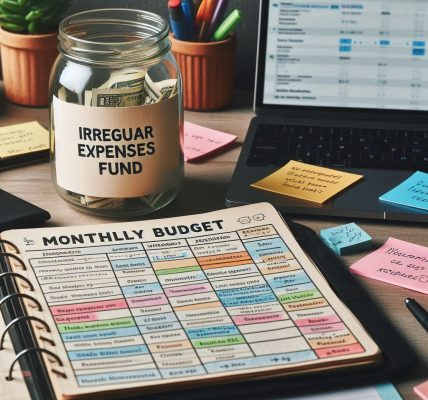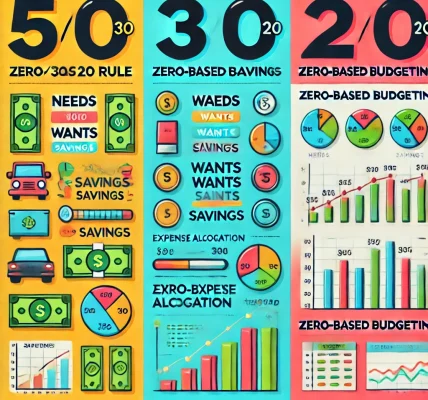📚 Introduction
Freelancers and gig workers enjoy the freedom of flexible schedules and the ability to choose their projects. However, managing irregular income can be challenging, making it difficult to stick to a budget and meet financial goals. Without a stable paycheck, freelancers often struggle with:
❗ Unpredictable Earnings
❗ Irregular Payment Cycles
❗ Difficulty Saving Consistently
In this blog, we’ll explore practical budgeting strategies that freelancers and gig workers can use to gain control over their finances. The content is designed to be SEO-friendly, legally compliant, and audience engaging, ensuring readers get maximum value.
🎯 Why Budgeting is Crucial for Freelancers and Gig Workers
Unlike traditional salaried employees, freelancers often experience income volatility, where earnings fluctuate month-to-month. This unpredictability can:
➡️ Disrupt Financial Planning
➡️ Make Saving for Emergencies Difficult
➡️ Result in Debt Due to Poor Cash Flow Management
Key Benefits of Budgeting for Freelancers:
✅ Stabilize Cash Flow
✅ Prepare for Lean Months
✅ Avoid Overspending During High-Earning Periods
📊 Common Budgeting Challenges Faced by Freelancers
🧩 1. Irregular Payment Schedules
Clients often pay at different intervals—sometimes immediately, other times after 30–60 days.
✅ Solution: Create a buffer fund to cover expenses while waiting for payments.
🧩 2. Difficulty Predicting Future Income
Freelancers face uncertainty about how much they’ll earn each month, making it hard to plan long-term.
✅ Solution: Use a baseline budgeting method where you calculate the minimum amount required for essential expenses.
🧩 3. Lack of Employee Benefits
Unlike traditional employees, freelancers don’t have access to paid leave, insurance, or retirement plans.
✅ Solution: Build a self-funded safety net to cover unexpected expenses and insurance needs.
💡 10 Smart Budgeting Strategies for Freelancers and Gig Workers
📈 1. Calculate Your Average Monthly Income
Review your income for the last 6–12 months to calculate an average monthly amount.
✅ Formula: Average Income=Total Income for Last 12 Months12\text{Average Income} = \frac{\text{Total Income for Last 12 Months}}{12}Average Income=12Total Income for Last 12 Months
👉 Use this average to set realistic budget goals.
📈 2. Create a Bare-Bones Budget for Essential Expenses
Identify your fixed and variable essential expenses and calculate the minimum amount required to cover them.
✅ Essentials Include:
- Rent or mortgage payments
- Groceries and utilities
- Insurance premiums
- Debt payments
💡 Pro Tip: Base your budget on your lowest monthly income to stay prepared for lean months.
📈 3. Separate Business and Personal Finances
Maintain separate bank accounts for business and personal expenses.
✅ Why It Matters:
- Simplifies tax filing
- Helps track business-related expenses accurately
- Prevents overspending on personal expenses
📈 4. Build a Buffer Fund to Cover Lean Months
Since freelance income fluctuates, it’s essential to maintain a buffer fund to cover at least 3–6 months’ worth of expenses.
✅ Goal: Save 20–30% of high-earning months into this fund.
📈 5. Adopt the 50/30/20 Rule with a Twist
The traditional 50/30/20 rule allocates:
- 50% to essentials
- 30% to wants
- 20% to savings and debt repayment
💡 Freelancer Twist: Allocate 30% toward taxes and business reinvestment during high-income months.
📈 6. Pay Yourself a Monthly Salary
Treat your freelancing earnings as business revenue and pay yourself a fixed monthly salary from your income.
✅ Pro Tip:
Transfer a fixed amount from your business account to your personal account each month to simulate a regular paycheck.
📈 7. Use Sinking Funds for Irregular Expenses
Sinking funds allow you to set aside money for future expenses such as:
- Annual software subscriptions
- Equipment upgrades
- Tax payments
✅ How It Works: Allocate a fixed percentage toward sinking funds monthly.
📈 8. Prioritize Emergency and Retirement Savings
Freelancers must build their own safety net, so focus on:
✅ Emergency Fund: Aim for 6–12 months of living expenses.
✅ Retirement Contributions: Consider opening an NPS (National Pension System) or PPF (Public Provident Fund) account for long-term wealth building.
📈 9. Leverage Budgeting Tools and Apps
Budgeting apps can help freelancers track income, expenses, and savings goals.
✅ Recommended Apps:
- Mint
- YNAB (You Need a Budget)
- PocketGuard
📈 10. Plan for Taxes and Deductibles
Set aside 20–30% of your income for taxes and keep track of deductible expenses such as:
- Office supplies
- Internet and utilities
- Marketing and advertising expenses
💡 Pro Tip: Use tax-saving investment options like ELSS or PPF to reduce taxable income.
🧠 How to Handle Fluctuating Income Like a Pro
📚 1. Use a Zero-Based Budget
Zero-based budgeting ensures that every rupee you earn is allocated to specific categories.
✅ Formula: Income−Expenses=0\text{Income} – \text{Expenses} = 0Income−Expenses=0
👉 This approach helps prevent overspending and ensures you’re saving during high-income months.
📚 2. Set Multiple Income Goals
Define short-term, mid-term, and long-term income goals to guide your financial decisions.
✅ Example:
- Short-Term: Cover monthly expenses
- Mid-Term: Build a 6-month emergency fund
- Long-Term: Invest for retirement
📚 3. Automate Savings and Investments
Set up automatic transfers to your savings account or investment portfolio.
✅ Best Options for Freelancers:
- SIPs in Mutual Funds
- PPF for long-term savings
- Recurring Deposits (RD) for short-term goals
📊 How to Track Your Progress and Stay on Budget
✅ 1. Conduct Monthly Reviews
Review your expenses and income each month to assess whether you’re staying on track.
✅ Ask Yourself:
- Did I stick to my budget this month?
- Where can I cut unnecessary expenses?
✅ 2. Adjust Your Budget Based on Income Fluctuations
Freelancers need to adjust their budgets based on high or low-income months.
✅ Pro Tip: Increase savings and investments during high-income months to cover lean periods.
✅ 3. Celebrate Small Wins
Recognize and celebrate milestones, such as sticking to your budget for 3 consecutive months or building your emergency fund.
✅ Reward Ideas:
- A favorite meal
- A small treat within budget
🚨 Mistakes to Avoid When Budgeting with Irregular Income
🚫 1. Underestimating Taxes and Business Expenses
Freelancers often forget to factor in taxes and business-related expenses, leading to unexpected financial burdens.
🚫 2. Spending Excessively During High-Income Months
Avoid lifestyle inflation by maintaining consistent spending habits even during profitable periods.
🚫 3. Ignoring Retirement Savings
Since freelancers lack employer-sponsored retirement plans, prioritize creating your own retirement fund.
📢 Conclusion: Take Control of Your Finances as a Freelancer
Budgeting with irregular income requires discipline, planning, and smart financial strategies. By using a combination of zero-based budgeting, sinking funds, and automated savings, freelancers can:
✅ Stabilize Cash Flow
✅ Build Emergency and Retirement Savings
✅ Achieve Long-Term Financial Stability
Pro Tip: Review your budget regularly to stay on track and make adjustments as your income evolves. 💼📊




